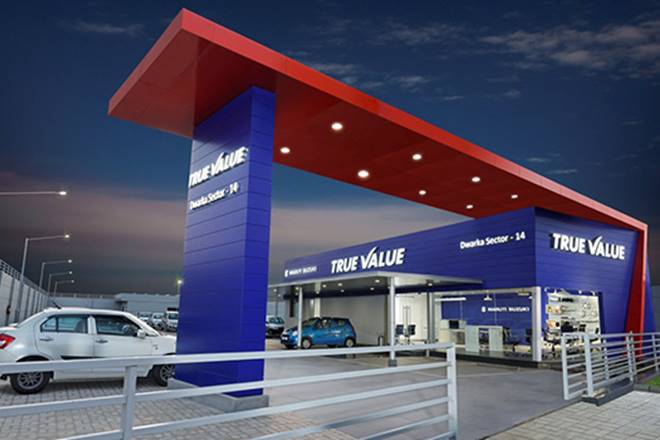If Maruti Suzuki’s pre-owned car business, True Value, was a separate car company, it would be the third largest in India, after Maruti Suzuki and Hyundai India. Started in 2001, True Value was the first major organised player in the market, and today it has over 570 brick-and-mortar showrooms in 280 cities; in FY20 (April-February), it sold over 4 lakh cars, recording sales growth of 3.7%.
How does True Value work?
Earlier, if anyone wanted to buy a new Maruti Suzuki vehicle, she has the option of exchanging her old car (any brand) at a company dealership. That car, if it was a Maruti, used to undergo a 376-point check, and was then sold as a refurbished pre-owned car at a True Value outlet. The customer of that refurbished car got new-car benefits such as three free services and warranty. (If the exchanged car was of another brand, it was usually sold separately in the market.)
What has changed?
On Saturday, Maruti Suzuki announced that it will now start ‘direct buying’ of old cars. Essentially, any seller can approach True Value and sell any brand even if she doesn’t want to buy a new Maruti car. Shashank Srivastava, executive director, Marketing & Sales, Maruti Suzuki India, says that one of the reasons behind this step is True Value cars are seeing increased demand. “Whatever stock we have (at True Value) is usually sold quickly, but the replacement only comes by way of exchanged cars; there are times when we don’t have enough cars. That’s why we have started sourcing vehicles not only from exchange customers, but from anybody who wants to sell her car.” This step, Srivastava adds, will lead to more transparency in the Indian pre-owned car space.
“There are three things a seller wants: One, the best price for her old car; two, convenience (she doesn’t want to advertise at multiple channels or contact numerous people to sell the old car); and the third is transparency, i.e. the right price and the right customer (what if the car falls in the hands of anti-social elements?). We have put in place a quick system of settlement of payments, a seller can get the car evaluated digitally at home, and the entire documentation is also taken care of. Therefore, it is convenient for anyone to sell any car to True Value,” he says. “We are now into the full-fledged business of buying and selling used cars.”
Why the focus on used cars?
The pre-owned car market, at 40 lakh unit sales in FY19, is 1.2 times the size of the new car market, and it’s getting organised. According to data from Indian Blue Book (IBB)—the pre-owned vehicle valuation website—the organised channel of the pre-owned car market (True Value, Mahindra First Choice and Cars24, among others) almost doubled its share from 10% in FY11 to 18% in FY19. In addition, a pre-owned car opens the door for two-wheeler owners, who want to upgrade to a four-wheeler. According to IBB data, over 85% two-wheeler customers choose a pre-owned car as a stepping stone to progress towards a new car. That’s one of the reasons Maruti Suzuki is betting big on True Value. “Even as new-car sales dropped last year, the pre-owned car market recorded growth,” says Srivastava. “With this step, we expect the True Value sales channel to grow even more.”
